Annual Report
ANNUAL REPORT FOR THE YEAR 2019-2020
The year 2020 has been one of the most unusual years of the century. It started with the scare of a contagion which, in a matter of weeks, became a pandemic touching every human life. For us in India, its most abiding image was of millions of scared and exhausted workers and their families walking, cycling or trudging long distances in sweltering summer. The pandemic has left close to two million dead around the world and devastated families, businesses, trade and economies. It has also changed the way we work, travel or communicate with each other.
Common Cause team also adjusted to the ‘new normal’ after the lockdown. We took to working remotely while doing our best to minimise the sufferings of fellow citizens. The staff donated one day’s wages and the organisation gave three lakh rupees for relief out of its already stretched funds. Our activities continued as usual except for face-to-face surveys for the Status of Policing in India Report (SPIR 2020) which had to be postponed. Common Cause journal, our link with members and well-wishers, went digital to overcome logistical challenges.
During the year, our external funding from the Tata Trusts has ended and is unlikely to be renewed in its present form. We have asserted that the time series data compiled by the SPIR series needs to be continued on a long-term basis as envisaged at the beginning of the project. We are waiting to hear from them. Common Cause was shortlisted by two other funders who showered praises on our proposals but finally shied away from making a grant. The society’s finances were further stressed as the tenant of our building demanded a rent waiver due to adverse market conditions.
Advocacy and Research Initiatives
(a) Police Reforms Status of Policing in India Report (SPIR 2020-21): Common Cause, along with the Lokniti team of the Centre for Study of Developing Societies (CSDS) is working on the SPIR 2020-21.
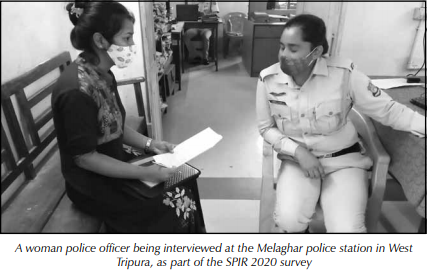
The study will be the third in the series of SPIR, with the previous two studies focusing on citizens’ perception of police in SPIR 2018 and the working conditions of police personnel in SPIR 2019. SPIR 2020-21 will explore the twin themes of policing in extraordinary circumstances, through its two separate sections, (a) Policing in conflict areas, i.e., in locations where some form of internal unrest, militancy or Naxalism exists and (b) Policing during the pandemic, focusing on policing after the nationwide lockdown. Perspectives of key stakeholders, including common citizens and police personnel, are being captured through a survey in the selected districts.
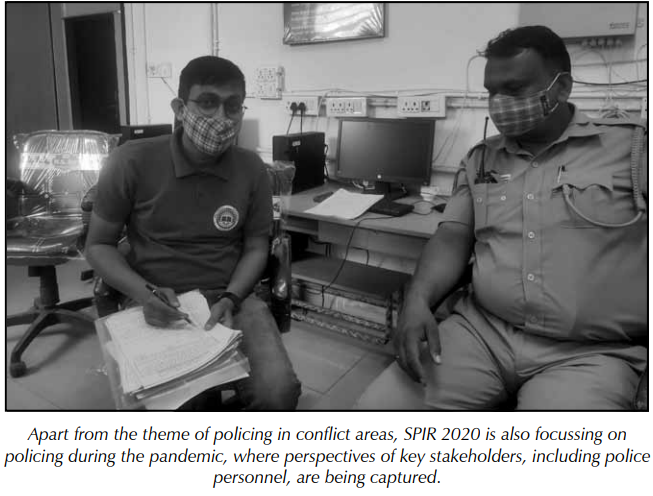
Conducting surveys for SPIR has been extremely challenging this year. Face-to-face interviews were not allowed in many regions even after the lockdowns were lifted. While Covid-19 cases were still on the rise, we had to first postpone surveys from March to August and then again to
September and October due to continuation of restrictions imposed by the central, state governments or the local authorities. Closure of colleges, universities and the general atmosphere of fear posed further challenges. Fortunately, the fieldwork finally started in all the states except part of the Union Territory of
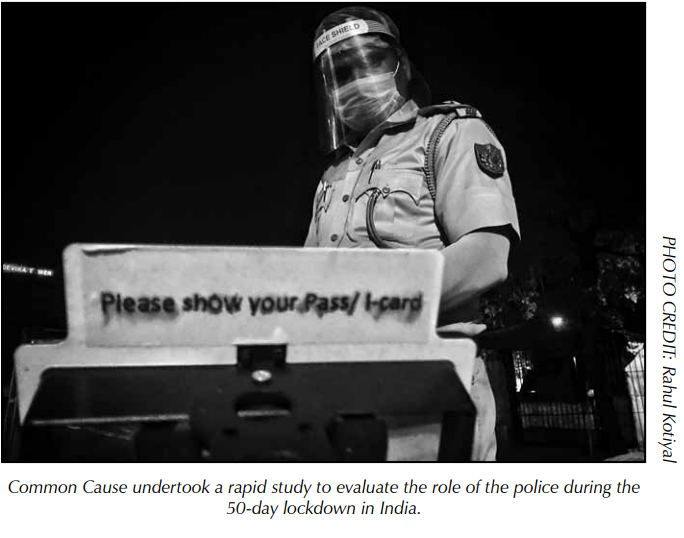
Jammu and Kashmir in October 2020. As of now, data has been collected in all the shortlisted districts, except in Srinagar, and a truncated provisional report has been submitted to the funders in order to meet the deadline.
Study on Policing during the Pandemic: During the nationwide lockdown, the police
force became virtually the face of the state. Apart from health workers, whose work directly concerns dealing with patients and matters of public health, the police were tasked to perform a range of duties which do not strictly fall within the purview of their routine functions. Their role was also central to the nation’s disaster management strategy—from enforcing the lockdown to maintaining the law and order and even ensuring the distribution of rations, among many other defined and undefined duties.
Common Cause undertook a rapid study to evaluate the role of the police --- their attitude, preparedness and overall performance during the 50-day lockdown in India. The dipstick study is based on interactions with various stakeholders, including aid workers at the grassroots, migrant workers, civil society organisations etc.
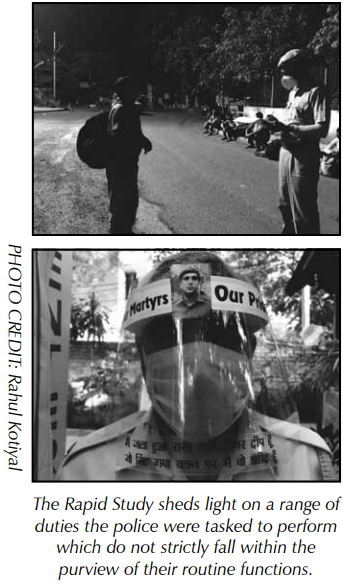
and on an analysis of news reports. Funded by the Lal Family Foundation in response to a Tata Trust initiative, the project also aims to identify and encourage good practice in the justice delivery system. It is part of a collaborative effort to analyse the functioning of the four pillars of the justice system. Our collaborators in this include civil society organisations across the country.
(b) India Justice Report 2020 Common Cause, in collaboration with other organisations working on reforms in the different pillars of the criminal justice system, such as the Commonwealth Human Rights Initiative (CHRI), Daksh, Vidhi Centre for Legal Policy, TISS-Prayas, Centre for Social Justice and the Tata Trusts
is working on a second study in the series of the India Justice Report (IJR). IJR 2020 builds on the framework of the 2019 report to rank individual Indian states in relation to their capacity to deliver access to justice.
Along with contributing towards developing a framework for the analysis of the 2020 report, Common Cause has also been part of the core team on the policing pillar for the study. Several new indicators for improving the ranking of states have been added. The release

of the IJR 2020 was delayed on account of the national lockdown as well as the delay in the release of official statistics from the Bureau of Police Research and Development (BPRD) which was crucial for updating the 2020 report. It is currently due for release in January 2021.
(c) #CheckYourChallan - A Public Interest Campaign Alerted by many leading citizens of Delhi, Common Cause initiated #CheckYourChallan campaign to promote awareness about the asymmetry in the issuance of e-challans for traffic violations. Already reeling under Covid-19 losses, ordinary citizens have been facing severe
distress by the introduction of the new e-challan systems and e-payment gateways in various states. Common citizens have faced numerous obstacles in dealing with technology-driven processes despite these being aimed at simplifying things. The campaign can be joined at https://bit.ly/3aAPsDk or at the Common Cause website https:// bit.ly/3avi80x
Common Cause is concerned with the way citizens have been caught unawares by the online mechanism of monitoring traffic violations. The digital-first process has disproportionately affected vehicle drivers and owners, particularly from the lower and middle-income groups. The non-delivery of challans may not only lead to non-payment of penalties and crippling fines but also in jail
terms in certain cases. Common Cause has filed representations to the Commissioner of Police, Delhi, as well as the Ministry of Road Transport and Highways. In a subsequent one-on-one discussions with the Joint Commissioner of Delhi Traffic Police, Common Cause has suggested that the authorities carry out an awareness campaign with the participation of citizens.
The current campaign is aimed at generating awareness across social media platforms about the exact procedure of checking e-challans. We are trying to reach out to a wider audience through digital channels.
(d) Webinars, podcasts, virtual discussions on Policing India’s Policing Challenges— Carnegie Endowment, Grand Tamasha, June 9, 2020: Milan Vaishnav, the Director and Senior Fellow of the Carnegie Endowment, Washington DC, featured Common Cause in a special programme of 40 minutes to discuss aspects of policing in India including its colonial legacy, attitudes, adequacies, competencies, and operational challenges faced by the police officers on the ground. The podcast, based on an interview with the Director, highlighted the findings of the Status of Policing in India Reports and a blueprint for reforms. The podcast is available at https://bit.ly/3mC4yef
Policing a Pandemic: July 9, 2020. Zoom Webinar: Policing: Past, Present and Future series: Another discussion on policing was organised by the India chapter of Carnegie Endowment and Tata Trusts to discuss the emerging challenges in the midst of the pandemic in India. Common Cause Director was joined by Mr. N. Ramachandran, President, Indian Police
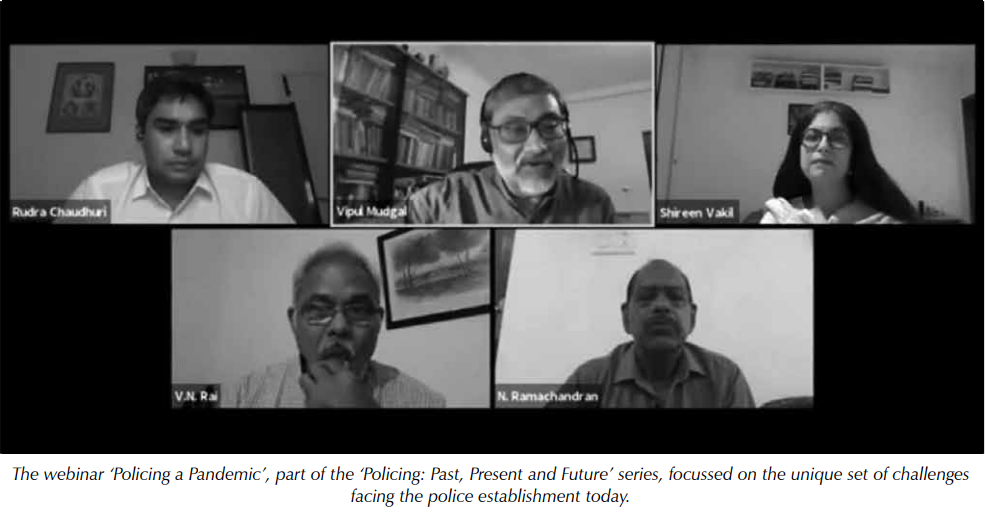
Foundation & Institute, Mr V.N. Rai, former Director-General, UP Police and Shireen Vakil, head of policy and advocacy, Tata Trusts. The discussion which was livestreamed on many channels focused on the unique set of challenges facing the police establishment today. The discussion, moderated by Rudra Chaudhuri, director of Carnegie India, looked at how institutions and personnel on the ground grapple with the ongoing health emergency. The webinar can be accessed at https://bit.ly/3he7sVt
Police Dialogues: Is Policing a Thankless Job? September 8, 2020: A very well-attended virtual discussion was livestreamed on YouTube, Facebook etc. and moderated by TV personality Faye D’Souza. Organised by a Mumbai-based think tank dedicated to police reforms, the discussion featured Common Cause Director along with the Indian Police Foundation President Mr. N. Ramachandran and Former Commissioner of Police, Pune, Ms Meeran Chadha Borwankar. The discussion can be accessed at https://bit.ly/3rl1Ayy
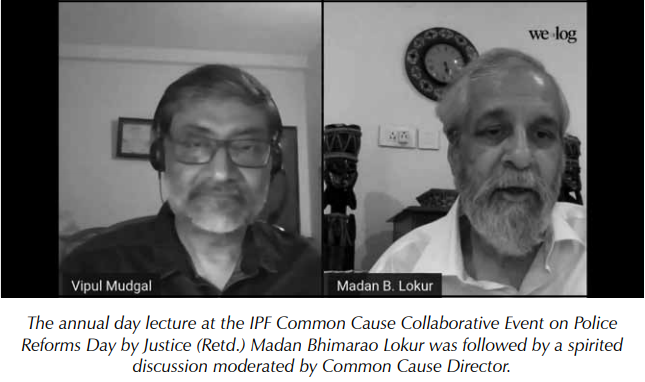
‘Reforms in Police and Criminal Justice are crucial to safeguard the democratic rights of citizens’: IPF-Common Cause Collaborative Event on Police Reforms Day, September 22, 2020:
Justice (Retd.) Madan Bhimarao Lokur delivered the Indian Police Foundation’s annual day lecture, organised by IPF in partnership with Common Cause, on September 22, 2020. Titled ‘Reforms in Police and Criminal Justice are crucial to safeguard the democratic rights of citizens,’ the lecture was followed by a spirited discussion moderated by Common Cause Director. Speaking on the occasion, Justice Lokur pointed out that “Everybody, including state govt, UTs and the Govt of India, agreed that the recommendations of the National Police Commission should be implemented. Yet, 14 years down the line, no progress has been made.”
Justice Lokur also underscored how it is the democratic right of every citizen to report and register a crime, particularly when they are a victim.
“It is the obligation of the police to follow the law laid down by the Supreme Court but we see that even after the Constitution Bench decision, the law is not necessarily being followed,” he said. IPF Chairman Mr Prakash Singh, former DGP, UP, Assam and BSF, asked whether “anybody tried to work out the cost of an inefficient and incompetent police?” He explained that the steep price of an insensitive and incompetent police force is more crime, bad internal security situation, incidents of terrorism, Naxalism and insurgency, among other things.
‘Police, Adalat Aur Insaf,’ A major podcast on Apple, Spotify, Google Podcast, Amazon Music, Jio Saavn and other networks: Common Cause has collaborated with Cine Ink to start the Podcast Series ‘Police, Adalat Aur Insaf,’ in Hindi. Based on the key pillars of the criminal justice system --- the police, prisons, legal aid, and the judiciary, it draws heavily on the SPIR and the IJR. Presented by Pervaiz Alam, senior broadcast journalist and a former BBC anchor, the podcast series is based on interviews with experts, analysts and researchers in India, working in the areas related to police and judicial reforms. Besides Ms Radhika Jha and Dr Mudgal from Common Cause, the other experts include Ms Maja Daruwala, Mr. Harish Narasappa, Prof. Vijay Raghavan, Ms Sugandha Shankar, and Mr. Vibhuti Narayan Rai.
All episodes are also available on www.cineink.com/podcast
(e) Common Cause Journal: The digital format of the journal continues to engage with the society’s members, wellwishers and public-spirited individuals on a range of issues to improve governance, to deepen democracy and to reinforce probity in public life. Our engaged set of readers keep sharing their viewpoints on the critical issues discussed in the journal articles. The digital format allows us to present the journal in colour which we could not earlier afford in the printed version. The only disadvantage of this format of the journal is that it does not reach those members who have not shared their email ids with us and who prefer to get a printed copy.
(f) Initiatives on the Right to Education Making the Right to Education Act a Reality: Common Cause launched its ambitious booklet in Hindi ‘Humara School, Humari Rakhwali,’ in July 2018, aimed at empowering members of the School Management Committees (SMCs) to improve community participation in the running of schools, particularly in slums and urban villages. The pandemic related restrictions prevented the physical distribution of our SMC booklets, as schools remain shut and education-related discussions migrated online. However, Ms tSusmita Saha represented Common Cause at several webinars organised by civil society coalition RTE Forum on issues faced by children after the school shut down. Common Cause team continues to be in touch with the groups and coalitions working on the Right to Education.
(g) Applications filed under the Right to Information Act e-Challans: Common Cause has filed an RTI application before the Ministry of Road Transport and Highways on September 20, 2020, to seek information about the grounds of issuing challans, methods through which e challans are communicated to violators and the number of challans issued between September 1, 2019, and September 1, 2020, among other things. These questions were asked as part of our campaign #checkyourchallan, which aims to promote awareness of e-challans among common citizens.
Rapid Study on Policing: We have also filed four RTI applications before the Commissioners of Police for Delhi, Mumbai, Gujarat and Rajasthan, between, September 2020 and October 2020. This was done as part of the data collection exercise undertaken for the Rapid Study on Policing during the pandemic. We sought information on the legal frameworks in place to enforce the lockdown restrictions.
Illegal Mining in Odisha case: Common Cause filed an RTI application on November 26, 2020, before the Public Information Officer, Rural Development Department of the Government of Odisha. We sought information pertaining to the operation of the Odisha Mineral Bearing Areas Development Corporation, a special purpose vehicle (SPV) set up to work for the benefit of the afflicted tribal communities, post the judgment in the Common Cause vs. Union of India and Another W.P. (Civil) No. 114 of 2014.
(h) Miscellaneous Representations Representation to the Ministry of Corporate Affairs: In response to the ministry’s Draft Companies (CSR Policy) Amendment Rules, 2020, Common Cause submitted its comments and suggestions on March 25, 2020. The main provision of concern was Rule 4 (2), which made registered trusts and societies ineligible to receive CSR funds once the Act comes in force. Common Cause highlighted the unprecedented nature of the move, citing past committee reports initiated by the ministry. This included the High-Level Committee on CSR, set up on September 28, 2018, in which there was no mention of removing registered trusts and societies from the CSR funding pool. We also underlined the negative impact this move would have on the civil society activity portfolio and CSO- government collaborations. We requested the govt to reconsider this provision so that registered trusts and societies continue to receive CSR funds.
Comments Submitted to the Election Commission of India: In response to the call for comments/suggestions for recommendations of the ECI Working Groups on Various Aspects of Electoral Management, Common Cause submitted both general and specific comments on March 30, 2020. We also submitted a ‘call to action’ document titled ‘Safeguarding Democracy from Digital Platforms,’ for increased regulation on the use of digital platforms for electoral campaigning. (This was a follow up to the press conference held on April 5, 2019, by the Constitutional Conduct Group, Common Cause, Internet Freedom Foundation, Free Software Movement of India, Association for Democratic Reforms, and former Chief Election Commissioners, Dr N. Gopalaswami and Dr S. Y. Quraishi). We stressed on the need to monitor and regulate expenditure and use of digital news media platforms by political parties. We also appealed for the repeal of Electoral Bonds to ensure elections remain free, fair and autonomous from undue corporate deal-making and foreign influence.
Representation to the Ministry of Consumer Affairs, Food and Public Distribution: On May 4, 2020, Common Cause sent a representation to the Union Minister of Consumer Affairs, Food and Public Distribution Ram Vilas Paswan, providing suggestions to address the mounting food insecurity among vulnerable populations after the coronavirus lockdown. Underscoring the need for urgent action to mitigate hunger and distress, we pointed out how crores of people were going hungry despite the surplus buffer stocks in government granaries. Common Cause also suggested a bevvy of measures to address the food security crisis, including the addition of all eligible persons under the National Food Security Act as per the estimated population of 2020-21, instead of still using the outdated 2011 census data.
Representation to the Prime Minister: Common Cause, along with Right to Education Forum, several academicians and civil society organisations, urged the government on May 11, 2020, to take steps to ensure that children enjoy their rights to survival, protection, education and development during and after the COVID-19 pandemic without any discrimination based on religion, gender, class and caste. We suggested that in order to safeguard food security of India’s children, the government should ensure smooth implementation of the notification for home delivery of mid-day meals and the Supreme Court’s suo moto order for providing nutritious food to children and lactating mothers through the Anganwadi Centres on an urgent basis.
Representation to the Ministry of Home Affairs: On May 12, 2020, Common Cause submitted a representation to Mr. Amit Shah, Union Minister of Home Affairs, highlighting the plight of domestic workers during the COVID-19 crisis. It requested the Government of India to issue a specific order to include domestic workers in the category of ‘migrant workers’ and ‘daily wagers’ so that they receive at least 50% of their monthly wages under the aegis of the urban local bodies and the residents’ welfare societies. This was in response to a circular issued by the Ministry of Home Affairs on March 29, 2020, detailing protections for migrant workers as a specific category.
Representation to the Ministry of Environment, Forests and Climate Change: On June 24, 2020, Common Cause submitted its response to the Draft Environmental Impact Assessment 2020 Notification to Mr. C.K. Mishra, Secretary, Ministry of Environment, Forests and Climate Change. Our representation stated how the Draft Notification significantly dilutes the provisions of the EIA Notification, 2006, and waters down several provisions of the parent legislation, the Environment (Protection) Act, 1986. This results in the erasure of long-standing principles of environmental jurisprudence, such as the Polluter Pays Principle, Precautionary Principle, Public Trust Doctrine and the standards set out in international conventions such as the Rio Declaration on Environment and Development, 1992, and the Paris Agreement, 2015. We emphasised, among other things, on how the notification went against precedents set by the Indian courts and the National Green Tribunal.
Response to Committee for Reforms in Criminal Laws Consultation: Common Cause has been sending its submissions to the questionnaire-based consultation started by the five-member Committee for Reforms in Criminal Laws, set up by the Ministry of Home Affairs. The questionnaire has been divided into six tranches and it concluded on October 9, 2020. The Committee has also been tasked with looking into the possibility of newer legislation on varied subjects, right from sedition to marital rape. In addition, it was scheduled to weigh in on myriad issues, including whether mob lynching should be penalised as a separate offence. We have submitted our detailed comments on two instalments of the questionnaire related to the reforms process. The responses to the First Consultation on Substantive Criminal Law, submitted on July 17, 2020, dealt with Strict Liability Offences, Offences Against the State, Offences Affecting Human Body, Sexual Offences, and many other issues. We offered our responses to the Second Consultation on Substantive Criminal Law on August 11, 2020, which focused on Offences By or Relating to Public Servants, Offences Relating to Public Tranquility, Offences Affecting the Public Health, Safety, Convenience, Decency and Morals, among other things.
Representation to the Ministry of Labour and Employment: On August 20, 2020, Common Cause sent a representation to the Deputy Director, Union Ministry of Labour and Employment, on the Draft Code on Wages (Central) Rules 2020, which is aimed at providing the base and procedures to implement the Code on Wages, 2019. We stressed on the necessity for having eight hours of work in a day and 48 hours in a week, as well as one or more intervals of rest. In addition, we pointed out how the number of work hours in a normal working day, including rest intervals, should not exceed 10 ½ hours. We also recommended that the rest day should be treated as leave with wages.
UNEP Mineral Resource Governance Resolution: In response to UNEP’s Regional Consultative Meetings on the UN Environment Assembly resolution on Mineral Resource Governance, Common Cause submitted its comments and recommendations on September 3, 2020. We suggested that since minerals represent great national wealth, a global wealth asset management system is in order to ensure that mineral wealth is not depleted with the present generation. We also stressed that the IMF and similar bodies must amend their standards to treat extraction and the State must be held responsible and liable for preservation of the mineral resources (not just limited to the prohibition of illegal/ unsustainable mining).
Representation to the Chief Executive Officer, National Health Authority: Common Cause sent a representation to the CEO, National Health Authority, in response to the draft Health Data Management Policy on September 21, 2020. The draft policy claims to protect citizens’ health data by regulating its collection and storage. However, we put forward our specific concerns in the representation and highlighted that unless there is an overarching data protection law in place, citizens must not be asked to disclose their health data against their interests.
Representations to the Principal Secretary to Govt of Odisha, Department of Steel & Mines, Director of Mines, and the PS to the Chief Minister of Odisha: Common Cause sent a representation to above mentioned authorities on December 8, 2020, to initiate action against mining companies for their non-compliance of the legal mandate of Rule-12A of Mineral Concession Rules, 2016 and Mine Development and Production Agreements. The non-compliant mining companies failed to maintain minimum dispatch of 80% of the average annual production of iron ore of two immediately preceding years on a prorata basis. Common Cause highlighted how the law does not provide any room to cover up the shortfall in the minimum production/dispatch by ramping up iron ore mining towards the end of the year.
(i) Miscellaneous Webinars/ Online Consultations/ Workshops ResiLens Stress Test Workshop, July 6, 2020 Radhika Jha of Common Cause attended the online ‘ResiLens Stress Test Workshop’ organised by Dasra, a Mumbai-based non-profit organisation, for assisting NGOs to streamline their projects and teams during the pandemic and overcome the consequent hurdles such as the requirement to shift to digital space, financial crunch, etc.
Adani & the Godda Coal Power Plant, August 10, 2020 Swapna Jha and Anshi Beohar of Common Cause participated in a deep dive session focusing on the impacts of Adani’s Godda Coal Power Plant. The session was organised by INSAF (Indian Social Action Forum) and Bangladesh Working Group on External Debt (BWGED) and featured several speakers, including the affected community representatives, campaigners, lawmakers, lawyers and researchers from Australia, Bangladesh and India.
Tata Trusts -- ‘INDIA JUSTICE REPORT, September 5, 2020 Common Cause Director was part of the panel discussion on “The Indian states in relation to their capacity to deliver access to justice.’ Organised by Citizens’ Forum India, the discussion also had other speakers, including Ms Maja Daruwala, Mr. Sanjoy Hazarika, Mr. Surya Prakash BS, Prof Vijay Raghavan, and Mr GaganSethi.
Roundtable - FCRA, 80G, funding strategies, October 16, 2020 Swapna Jha and Anshi Beohar of Common Cause participated in a roundtable discussion around the latest legislative changes affecting the NGOs. The discussion was organised by i-probono, an organisation dedicated to providing quality legal assistance for social causes. The interactive session featured legal and accounting experts, including Mr. Noshir H. Dadrawala, lawyer and Chief Executive, Centre for Advancement of Philanthropy and Chartered Accountant, and Mr. Anil Goyal of AKG Advisory LLP.
Democracy around the World: Social Inequality at Home and Abroad, October 21, 2020 Common Cause Director was a panelist at a discussion on rising economic, racial, and gender inequalities around the world. The well-attended global discussion was organised by Indiana University and had other speakers like Prof Birgit Pfau-Effinger, Research Professor for Cultural and Institutional Change, Universität Hamburg and Ms Gretchen Kuhner, Director of the Institute for Women in Migration (IMUMI) - a non-profit organisation based in Mexico City. The discussion, also featured on social media platforms, is available at https://bit.ly/3nHV0zU
Electoral Bonds: Boon or Bane for Democracy, November 1, 2020 The webinar was organised by Forum for Fast Justice, Mumbai and National Federation of Societies for Fast Justice, New Delhi on November 1, 2020. The webinar discussed if the Electoral Bonds constitute a form of legalising political corruption. The webinar featured Maj. Gen. Anil Verma (Retd.), the head of the Association for Democratic Reforms (ADR) and Dr Vipul Mudgal. The discussion carried forward the concerns of the plea filed by the ADR and Common Cause in the Supreme Court in 2017. The webinar can be accessed at https://bit. ly/3h5503w
National seminar and workshop on ‘Social Audits in India Today and An Agenda for Action, November 5-7, 2020 The Common Cause team (Ms Radhika Jha, Ms Anshi Beohar and the Director) participated as resource persons in a workshop organised by a consortium of NGOs that aimed at providing a platform to hear and learn about social audits from different perspectives. The seminar addressed the concerns of civil society activists, representatives of judiciary and government, social audit units, and researchers. The discussion provided an opportunity to reflect on the unique set of challenges and opportunities that the pandemic and ensuing lockdown have thrown at social audits.
2. Public interest litigation Supreme Court Cases Petition Challenging Reappointment of the ED Director: Common Cause has filed a PIL in the Supreme Court seeking a direction for the appointment of the Director, Enforcement Directorate (ED), in a fair and transparent manner and strictly in accordance with law as mandated by Section 25 of the Central Vigilance Commission Act, 2003. The writ petition has prayed for the quashing of the central government’s order dated November 13, 2020, to retrospectively amend the tenure of Mr Sanjay Kumar Mishra as ED Director. The petition points out that the order, extending the tenure of the Director, ED, is in violation of the CVC Act. It states that a circuitous route has been employed to give the ED Director one more year in the same position, by way of retrospectively modifying the appointment order dated November 19, 2018.
Mr Mishra was appointed as the Director on November 19, 2018, for a period of two years, which ended on November 18, 2020. An office order, dated November 13, 2020, modifies the order appointing him to the effect that the period of “two years” in the 2018 order shall be altered to “three years”. As of May 2020, he has reached the retirement age of 60 years, yet his tenure has been extended by a year in violation of the provisions of the CVC Act, 2003, the petition states.
Writ for Police Reforms: This matter was taken up on June 12, 2020, when the Court, as an exception, allowed Tripura to give relaxation of five years in the appointment of Director General of Police (DGP). The Apex Court held that the reduction in the period of experience for the appointment as DGP from 30 years of service to 25 years was a one-time exception, and maintained that the original rule will stay intact. It stated in its order that “as a result of the Union of India declining to release one eligible candidate, Mr Amitabha Ranjan, IPS, for appointment as DGP, there was only one other candidate available for appointment as DGP in the State of Tripura.” The amicus curiae suggested that the monitoring of the implementation of the guidelines resulting from the present case be relegated to the jurisdictional High Courts. In response, the Court felt that the matter required further consideration and directed it to be listed after four weeks. However, there have been no hearings on it so far.
Illegal Mining in Odisha: In its final judgment on August 2, 2017, the Supreme Court had imposed 100 per cent penalty on illegal mining (i.e., without forest and environmental clearances, mining outside lease/permitted area and mining in excess of permissions). This matter was taken up twice on March 23 and 27, 2020, when the Court granted relief to an applicant for sale of iron ore based on certain circumstances. In August 2020, the Court granted relief to Orrisa Minerals Development Company Ltd (OMDC) which had approached the Supreme Court requesting condonation of delay in compensation payment and other ancillary issues. Since then the OMDC had paid the compensation along with interest.
Hence, the Court condoned the delay as requested by OMDC. The company was also permitted to resume its mining operations, subject to all clearances. It was also allowed to sell its undisposed stock, subsequent to a joint verification by competent officers of the State of Orissa, vide order dated August 11, 2020.
3. Finance and Accounts (2019-20) The Audit Report on the Annual Accounts of Common Cause for the year ending March 31, 2020 has been received. The Governing Council has been requested to go through the report and accord its approval on December 28, 2020. Briefly, the expenditure during the year was Rs 166.69 lakh against Rs 192.99 lakh recorded in the previous year. The income during the year was Rs 191.57 lakh compared to Rs 203.67 lakh during 2018- 19. Thus, there was a surplus of Rs 24.88 lakh during the year as against a surplus of Rs 10.68 lakh in the previous year. Overall, the financial results have been satisfactory.



